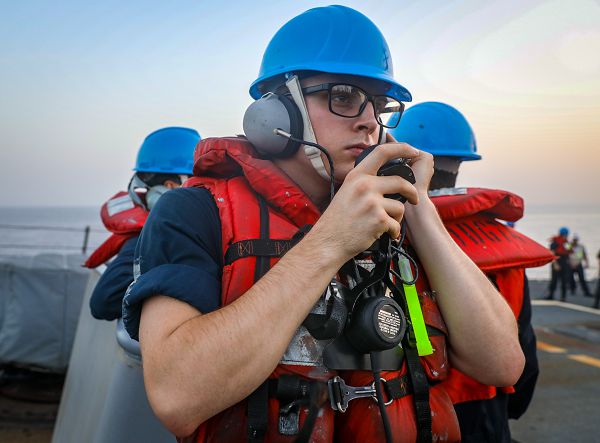
Gulf of Oman. (May 27, 2023): In this photo by MC2 Juel Foster, Cryptologic Technician (Collection) 2nd Class Drew Appleton, assigned to the Arleigh Burke-class guided missile destroyer USS McFaul, establishes communications during a replenishment-at-sea with the dry cargo ship USNS Alan Shepard in the Gulf of Oman.
There are three basic types of Cryptologic Technicians in the Navy, Collection, Interpretive, and Technical whose duties involve the collection and processing of airborne, shipborne, and land-based communication signals.
A Cryptologic Technician (Collection) collects, analyzes, and reports on communication signals using specialized computer-assisted communications equipment. These highly skilled professionals exploit signals of interest to identify, locate, and report enemy activity at sea. Cryptologic Technician (Collection) class "A" school is approximately 16 weeks long and is in Pensacola, Florida. Currently, there are 3,500 Sailors working in the Cryptologic Technician (Collection) on active duty.
Cryptologic Technicians (Interpretive) are the Navy’s linguistics experts who collect and analyze foreign language communications signals. They collect, analyze, and exploit foreign language communications to identify, locate, and monitor worldwide threats. The CT Interpretive analysts are trained to speak multiple tongues including Arabic, Chinese, Korean, Persian-Farsi, Russian and Spanish and are experts at deciphering information in other languages. CT (Interpretive) training is done in two phases, Phase One, depending on the language, is anywhere from 27 to 64 weeks in duration; Phase Two, class "F" school, depending on the language, is 6 to 12 weeks long. The school is located at the Defense Language Institute, Monterey, California.
Finally, there is the Cryptologic Technician (Technical) who controls and safeguards access to classified material and information systems. They transcribe, translate, and interpret foreign language materials, and prepare time-sensitive tactical and strategic reports. They also provide cultural and regional guidance to commanders operating in foreign waters.


